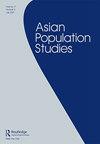伊朗城市地区配偶的家庭劳动分工
IF 1.5
4区 社会学
Q2 DEMOGRAPHY
引用次数: 6
摘要
在发展中国家,女性从事无偿工作的可能性是男性的3.5倍。作为一个传统的父权社会,伊朗存在着严格的性别角色,但没有经验证据表明社会中深刻的社会经济和人口变化是否改变了这些根深蒂固的分层性别角色。本文使用在伊朗城市地区进行的2014-2015年时间使用调查的数据来描述配偶的家务劳动分工,并确定这种分工的相关性。根据相对资源和时间可用性方法选择相关对象。结果表明,妻子参与家务劳动的可能性是丈夫的五倍,这比在发展中国家观察到的平均性别差距更大。研究结果为相对资源和时间可用性方法提供了部分支持,妻子的经验更符合这些方法。在家庭劳动分工及其相关方面存在的深刻的性别差距表明,在伊朗城市地区,性别角色的界定超出了社会经济和人口特征,至少在个人一级是如此。本文章由计算机程序翻译,如有差异,请以英文原文为准。
Spouses’ division of household labour in urban areas of Iran
ABSTRACT In developing countries, women are 3.5 times more likely than men to participate in unpaid work. As a traditionally patriarchal society, strict gender roles existed in Iran but there is no empirical evidence to show whether profound socio-economic and demographic changes in the society have altered these deep-rooted stratified gender roles. This paper uses data from the 2014–2015 Time Use Survey, conducted in the urban areas of Iran, to describe the spouses’ division of household labour and determine the correlates of this division. The correlates are selected based on the relative resources and time availability approaches. The results suggest that wives are five times more likely than husbands to participate in the household labour, which is wider than the average gender gap observed in developing countries. The findings provide partial support for the relative resources and time availability approaches, with wives’ experience being more consistent with these approaches. The existing profound gender gap in the division of household labour and its correlates suggests that in urban areas of Iran gender roles are defined beyond socio-economic and demographic attributes, at least on the individual level.
求助全文
通过发布文献求助,成功后即可免费获取论文全文。
去求助
来源期刊

Asian Population Studies
DEMOGRAPHY-
CiteScore
3.30
自引率
14.30%
发文量
12
期刊介绍:
The first international population journal to focus exclusively on population issues in Asia, Asian Population Studies publishes original research on matters related to population in this large, complex and rapidly changing region, and welcomes substantive empirical analyses, theoretical works, applied research, and contributions to methodology.
 求助内容:
求助内容: 应助结果提醒方式:
应助结果提醒方式:


